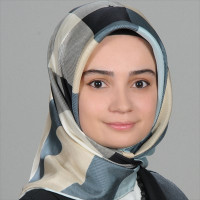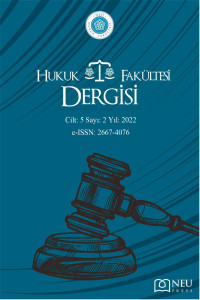Research Article
Aim & Scope
Necmettin Erbakan University Faculty of Law Review aims to contribute to national and international literature by publishing original and scientific articles in the field of law.
Necmettin Erbakan University School of Law Review is a double-blind peer-reviewed journal that accepts law related articles . Necmettin Erbakan University Faculty of Law Review is published online biannually (June and December). In addition to research articles on public law, private law, and fiscal law, court decision reviews, legislative reviews, book reviews and translations can be also submitted to Necmettin Erbakan University School Of Law Review . Submissions in Turkish, English, French, German and in any other European languages, are welcomed.
Author Guidelines
Necmettin Erbakan University School of Law Review Writing Guidelines
Correspondence adress: konyahukukdergi@gmail.com
Articles; must be prepared and submitted in Microsoft Word. Main body of text must be in 12-point font, Times New Roman with 1.15 spacing. Footnotes must be prepared in 10-point font, Times New Roman, regular style, with 1.0 spacing. Articles must be submitted via Dergipark system. In citation, footnote system must be used. Footnote system must be in accordance with examples which are given in Turkish format of writing guidelines.Page structure: Top and bottom margins must be 2.5 cm, and left and right margins must be 2 cm. The text must be double justified. As a rule, the article must be between 3000 -10,000 words including references. 10 pt space must be given after the paragraph. The first line of the paragraphs must be 1.25 cm indented. The references must be listed alphabetically in accordance with the authors' surname.On the first page of the article;
• First, the title of the article in original language must be written in bold and 14 pt font.
• One line blank must be given
• Heading of "Abstract" in articles original language must be in bold and 12 pt.
• Abstract of the article in original language must be written in 11 pt. Abstract should not be less than 125 words and should not exceed 300 words.
• At least 3 and at most 5 keywords must be given under the abstract.
• One line blank must be inserted.
• The title of the article in Turkish must be bold and in 14 pt. (If the original language of the article is Turkish, than author must write the title in English)
• One line blank must be inserted.
• Heading of "Özet" must be bold and in 12 pt. (If the original language of the article is Turkish, than author must write the abstract in English)
• Turkish abstract of the article must be 11 pt, Abstract should not be less than 125 words and should not exceed 300 words. (If the original language of the article is Turkish, abstract must be written in English)
• At least 3 and at most 5 keywords in Turkish must be given under the abstract (If the original language of the article is Turkish, keywords must be written in English)
• One line blank must be given
• At last, the INTRODUCTION section must be started without skipping the page, and the INTRODUCTION and CONCLUSION headings should not be numbered. Except for the main title of the article, all headings should be in 12 pt. and bold.
• Headings must follow: "I / A / 1 / a" arrangement. For detailed information, authors should check the sample text given in Turkish version.- The references used should be citated with the MLA system. For detailed information about MLA referencing: https://owl.purdue.edu/owl/research_and_citation/mla_style/mla_formatting_and_style_guide/mla_formatting_and_style_guide.html
- Citations to the sources, should be indicated as footnotes at the end of each page. All information in the references should be included in the first citation. The page used should be at the end of the tag.
If more than one work written by the same author have been used
• If the years of work are different, the year should be written in the second and the following citations.
• If the publishment years are the same, the name of the each publishment should be abbreviated and be used to distinguish it from the rest of the works from same author cited in the article.
Ethical Principles and Publication Policy
NECMETTİN ERBAKAN UNIVERSITY SCHOOL OF LAW REVIEW PUBLICATION POLICY
Correspondence address: konyahukukdergi@gmail.com
2. Articles submitted to Necmettin Erbakan University School of Law Review must not have been published or submitted for publication in any journal. Article has been submitted to Necmettin Erbakan University School of Law Review proves the commitment of the author in this regard. Articles submitted to the journal, are subject to a plagiarism test and it is accepted that the similarity rate should not exceed 20%.
3. Although the language of Necmettin Erbakan University School of Law Review is in general Turkish, submissions in English, German and French are also welcomed .
4. Article must incorporate a title, abstract which is consisted of min 125 max 300 words, and min three and max five keywords. For Turkish article submissions- in addition to the Turkish abstract- an abstract must be added in one of the languages: English, German and French. For articles written in a foreign language (English, German, French or any other European Language), abstracts in Turkish must be added.
5. "Article Author Information" form must be attached to the article. Article Author Information form should clearly and accurately contain the author's full name, title, institution information, e-mail address and ORCIDs.
6. It is assumed that the authors have audited the articles and submitted them as "ready for publication". In the preliminary examination by the editorial board, articles that do not comply with the scientific (field-based control will be applied) criteria and journal writing guideline or submissions which have more than usual spelling mistakes can be rejected.
7. The articles that are pre-assessed by the editorial board, will be reviewed by two reviewers in accordance with the blind review system. Authors will not be informed about identity of reviewers. If the reviewers want a correction in their reports, the author can only make changes within the framework of the specified corrections. This change must be made within 30 days, otherwise the Editorial Board has the right to reject the article. After the author makes the corrections suggested by the reviewers, it can be applied to the reviewers, review again in line with the suggestion of the reviewers. When one of the reviewers gives a positive and the other a negative opinion, the article is sent to a third reviewer or accepted for publication by the decision of the Editorial Board / Editor-in-Chief. Articles that are not published according to the reviewer decision or the Editor's decision are not sent back to the author. The author is informed about the situation.
8. The author reserves the right to make changes to the work if change in legislation has occured between the time period of acceptance for publication by reviewers and date of publication. In this case, depending on the degree of change, the editorial board can submit the article to review process again. The same procedures applies in the event of a legislative change regarding the articles in the review process.
9. In addition to peer-reviewed articles, the journal may also include book review, legislation review, informative notes, judicial decision analysis. Elimination of which type of studies will be published will be made by Necmetti editorial board. 10. If the articles are accepted for publication, all publishing rights belong to Necmettin Erbakan University. Authors are deemed to have transferred their copyrights to the Necmettin Erbakan University, no royalties will be paid to the author. Legal and criminal responsibility for the articles belongs to the authors.
Publication Ethics and Principles
2. Use of humans and animals (including material / data) for experimental or other scientific purposes,
3.Clinical studies on humans,
4. Research on animals,
5. Retrospective studies in accordance with the law on protection of personal data.
In this framework, in studies to be evaluated in Recmettin Erbakan University School of Law Review;
1. Stating that the "informed consent form" was obtained in case presentations,
2. Obtaining and indicating permission from the owners for the use of scales, questionnaires, photographs belonging to them,
3. It should be stated that the copyright regulations are complied with for the intellectual and artistic works used.
4. Editors ensure the protection of human and animal rights in the evaluated works.
Authors' Responsibility
Authors must comply on scientific and ethical rules. The author must assure that the article is original, has not been published elsewhere, and has not been submitted for publication elsewhere in another language. Copyright laws and treaties must be taken care into. Corresponding materials (eg tables, figures or large quotations) should be used with required permission and acknowledgment. Work or sources of other authors and contributors should be appropriately used and cited in references.
All authors must contribute to the submitted article, in academic and scientific terms. The "author" is someone who contributes significantly to the conceptualization and design of a published research; who leads to obtain, to analyze or to interpret the data, or to write the article or to critically review it in relation with the content. Other conditions to be considered as an author are planning or executing and / or revising the work in the article. Funding, data collection, or general supervision of the research group alone does not provide authorship rights. All individuals designated as authors must meet all the criteria listed above, and any individual who meets the criterias may be designated as an author. The name order of the authors should be a joint decision between authors. Authors’ name order must be listed on the Copyright Agreement Form.
All individuals who do not meet the sufficient criteria for authorship but contribute to the study should be listed in the “acknowledgments / information” section. People who only provide technical support, help with writing or just provide general support, financial and material support can be listed in the “acknowledgement” section.
All authors must declare financial relationships, conflicts of interest and competition of interest that have the potential to influence the results of the research or scientific review. If a writer detects a significant error or inaccuracy in his published article, he is responsible for contacting and cooperating with the editor immediately for correction or retraction of these inaccuracies.
Editors’ and Reviewers’ Responsibilities
The editor-in-chief evaluates the articles regardless of the authors' ethnicity, gender, sexual orientation, nationality, religious belief, and political stand point. NEU Law Review ensures that the articles submitted for publication, will be reviewed fairly by double-blind peer . NEU Law Review guarantees that all personal information about the submitted articles will remain confidential until the article is published. Editor-in-chief is responsible for the overall quality of the content and publication. It should publish a correction page or make a correction when necessary.
Price Policy
Necmettin Erbakan University School of Law Review does not charge any fees at any stage of the articles, including submission, evaluation and publication.
Authors do not pay article processing fee for the articles they submit to the journal. In addition, the authors are not paid royalties.
All expenses of the journal are covered by Necmettin Erbakan University.
Indexes
Journal Boards
Editor in Chief

Field Editors






Spelling and Language Editors


Layout Editors
Publication Editors
Editorial Board



Advisory Board


















